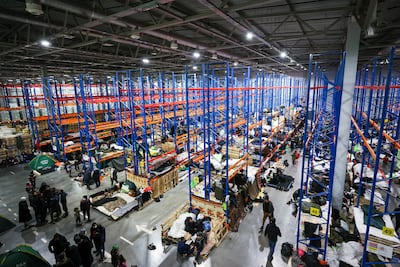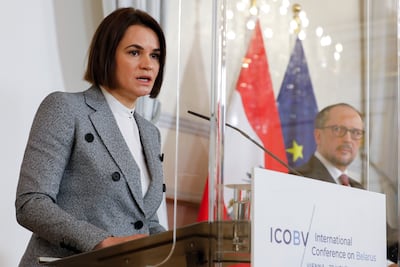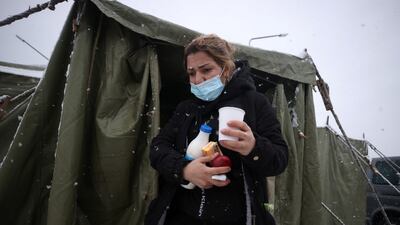Migrants stranded at the EU’s eastern border are increasingly suffering from hypothermia and more may lose their lives, humanitarian workers fear.
Concern for the migrants at Poland’s border with Belarus, where snow was falling on Tuesday, is mounting, despite some people being moved from makeshift camps.
Belarus is blamed by the West for engineering the border crisis by importing migrants from Iraq and other countries — but aid workers are critical of Poland for pushing migrants out of its territory.
The International Rescue Committee, a humanitarian group, estimates that 13 people have died so far, with some laid to rest by a small Muslim community on the Polish side of the border.
It said people had been living in freezing conditions without food, water or shelter, with “growing reports” of people suffering from hypothermia.
“The misdeeds of Belarus, which have lured vulnerable people into a political game, cannot be answered with inhumanity,” said Harlem Desir, vice president of the committee.
“The EU should continue to do all it can to dissuade Belarus from these actions which put people’s lives and dignity at risk. European countries must uphold people’s right to asylum and ensure that all claims are processed fairly and quickly.”
Belarus has moved some of the migrants to a warehouse near the border, but others are still living in tents.
In addition, there are reports of a Covid-19 outbreak among the migrants, said Oleg Ignatov, from the International Crisis Group.
“The approaching winter cold will soon make the crisis even more acute,” he said. Other aid agencies have raised concerns about children and pregnant women stranded at the border.

'Very strange' calls with Lukashenko
While humanitarian groups are calling for a de-escalation, President Alexander Lukashenko’s opponents are divided over how to handle the situation.
German Chancellor Angela Merkel held two direct calls with Mr Lukashenko, which led to a demand by Belarus that the EU should take in 2,000 migrants.
Sviatlana Tsikhanouskaya, who challenged Mr Lukashenko in a disputed election last year, described the calls as “very strange” — echoing similar criticism from Poland.
She asked EU ministers to “refrain from any contacts with the regime” until it releases political prisoners and eases its repression of the opposition.
“I understand why it has been done … to de-escalate the situation at the borders, but as a Belarusian, from the side of the Belarusian people it looked very strange,” she said.
Julie Fisher, the US ambassador to Belarus who is based in neighbouring Lithuania, said Mr Lukashenko's ally Russia could be contributing to the migrant crisis.
She cited Russia’s deployment of military forces near Ukraine, raising fears about its intentions.
“We are concerned that the migrant crisis has diverted attention away from Russia's military build-up near Ukraine and have urged our partners to keep a close eye on the region as well”, she said.
Mr Lukashenko said the EU was evading his demands to discuss the proposed transfer of 2,000 migrants. Germany has said this is not on the table.

A total of 118 people left Belarus from Minsk’s main airport on Monday, according to state media.
But Poland says the pressure at its eastern border is continuing despite efforts at de-escalation.
Another 174 people tried to enter Poland illegally from Belarus on Monday, Polish officials said, including 50 “aggressive foreigners”.
Poland’s Defence Ministry said soldiers had fended off the attack, which it claimed was “supervised by the Belarusian services”.
Belarus appealed to the UN on Tuesday, saying that the World Health Organisation should examine Poland’s treatment of the migrants.
Mr Lukashenko’s regime blames Polish guards, and the EU’s refusal to open its doors, for the plight of the stranded people.
A UN health meeting is “needed for all our colleagues who are members of the WHO to look at how health care is ensured by the European Union,” Belarusian Deputy Prime Minister Igor Petrishenko was quoted as saying by state media.
“We strongly recommend to take really effective measures in order to ensure a quick resolution of this crisis at the border.”


